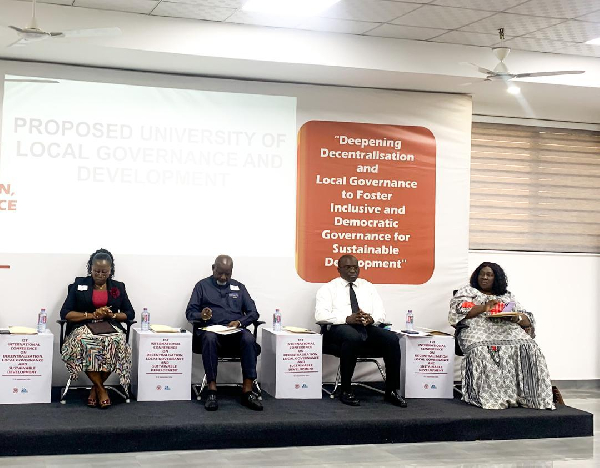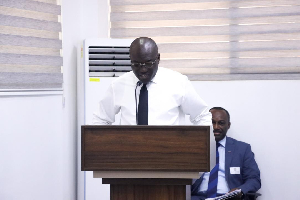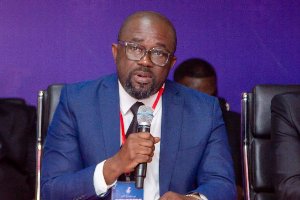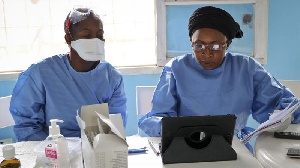The Minister of Local Government, Decentralisation and Rural Development, Martin Adjei-Mensah Korsah, has said Ghana is committed to aligning with international conventions and agreements that impact local governance and decentralisation, such as the Sustainable Development Goals (SDGs) and the African Charter on Decentralisation.
Speaking at the Maiden International Conference On Decentralisation, Local Governance, and Sustainable Development held on Wednesday, September 11, 2024, at the Institute of Local Government Studies, Accra, the minister said while there is still room for improvement in this regard, the commitment to attain the height of it is on course.
"It is instructive to note that, progress towards achieving democratic decentralisation for inclusive and accountable local governance, improved public service provision and local development has been relatively slow in the country. It has been observed that investments in the policy have not led to appreciable rise in outcomes.
"Current diagnoses suggest a number of challenges that include increased concerns about mismanagement and misapplication of funds by some MMDAs; inadequate competences of key staff and functionaries; poor organisational culture that does not demand accountability and performance; inadequate sense of urgency among functionaries on the plight of local residents who have limited access to economic opportunities and social services; inadequate citizens’ participation and downward accountability; ineffective inter- sectoral/agency coordination and partnerships; gender inequity and social exclusion; and general political polarization and the threat of recentralisation tendencies by some Ministries, Departments and Agencies – the desire to establish Authorities instead of devolving and deconcentrating functions for improved service delivery," he stated.
Martin Korsah explained further that there is continuous work at achieving these goals.
"In all of these, local governments are continuously being pursued to do more for their localities, even in times of dwindling finances and constant public scrutiny," he added.
The minister also stated that Ghana's efforts to decentralise, as per Article 240 of the 1992 Constitution, have been very tremendous, with a few successes chalked, despite some bottlenecks over the years.
The conference was on the theme, "Deepening Decentralisation and Local Governance to Foster Inclusive and Democratic Governance for Sustainable Development."
Read Martin Adjei-Mensah Korsah's full address below:
SPEECH DELIVERED BY HONOURABLE MARTIN ADJEI-MENSAH KORSAH (MP), MINISTER FOR LOCAL GOVERNMENT, DECENTRALISATION AND RURAL DEVELOPMENT DURING THE MAIDEN INTERNATIONAL CONFERENCE ON DECENTRALISATION, LOCAL GOVERNANCE, AND SUSTAINABLE DEVELOPMENT HELD ON WEDNESDAY 11TH SEPTEMBER 2024 AT THE INSTITUTE OF LOCAL GOVERNMENT STUDIES, OGBOJO -ACCRA
Distinguished Chairman, Prof. Yaw Agyemang Badu
Colleague Ministers of State
Honourable Members of Parliament
Emritus Prof. Kwasi Kwafo Adarkwa, Chairman of ILGS Council
Other Members of the ILGS Council
Mr. Charles Abani, the Resident Coordinator, United Nations
Prof. Joseph Roland Atsu Aryee, Political Science Department, University of Ghana
Dr. Emmanuel Akwetey, Executive Director, IDEG
Chief Director, MLGDRD
Chief Director, OHLGS
The Administrator, DACF
The Director, Institute of Local Government Studies
The Executive Secretary, IMCCoD
Chief Directors and Heads of Departments from RCCs and MMDAs
Faculty and Staff Members of the Institute
Hon. Metropolitan, Municipal and District Assemblies Chief Executives
Nananom, Nii mei and Naa mei
Development Partners
Special Invited Guests
The President of Students Representative Council (SCR)
The Alumni
Members of the Media Fraternity
Distinguished Ladies and Gentlemen:
Good morning!
I am very happy to be part of this conference, as it marks a significant milestone in our quest to deepen local governance and decentralisation in Ghana. Let me seize this opportunity to congratulate the Director of Institute of Local Government Studies (ILGS), Prof. Nicholas Awortwi and his entire Management as well as the Planning Committee for the organization of this historic maiden International Conference on Decentralisation, Local Governance, and Sustainable Development.
Prof. Chairman,
The Theme for this Conference, "Deepening Decentralisation and Local Governance to Foster Inclusive and Democratic Governance for Sustainable Development", resonates appropriately with contemporary issues on local governance and decentralisation in Ghana and across the globe. Clearly, our efforts as a country to decentralise as per Article 240 of the 1992 Constitution have been very tremendous and a few successes have been chalked despite some bottlenecks over the years. In this regard, your collective insights will be critical to make this Conference impactful and successful.

Distinguished Ladies and Gentlemen,
Decentralisation is a concept that helps policy makers and citizens to understand the relationships between the national (or central) government and sub-national (or local) governments in a country. It is based on the principle that local problems are better solved by local people themselves through their own means unless there is a convincing argument that a central solution is preferable. This is called the ‘subsidiarity principle’. This principal has guided decentralisation in both developed and developing countries. It is also considered as one of the cardinals in good governance. Thus, for us in Ghana, the renaming of the Ministry responsible for the sector as the Ministry of Local Government, Decentralisation and Rural Development pursuant to Executive Instrument 12, 2021 (E.I. 12) by His Excellency, Nana Addo Dankwa Akufo-Addo, the President of the Republic demonstrated our commitment to deepen the decentralisation agenda and realize its dividends at the local level.
Prof. Chairman,
Decentralisation has been used to achieve several objectives, the most common and well-known objective being, “bringing governance closer to the citizenry. Ghana has made great strides in this endeavour as the number of local government jurisdictions has increased from 110 in 1988 to 261 in 2021 with the most current District being Guan District Assembly in the Oti Region. Indeed, there are six (6) Metropolitan Assemblies, 117 Municipal Assemblies and 138 District Assemblies. The increased size of local government units has made it easier for government and services to be delivered effectively and efficiently to the residents in relatively small jurisdictions. Thus, administrative convenience and access to public services largely has been improved.
Prof. Chairman,
Ghana like most countries, is a signatory to many international conventions and agreements that have implications for local governance and decentralisation. We are therefore committed to aligning and localizing these international commitments and obligations. These include;
• The 1985 International Union of Local Authorities (IULA) Universal Declaration of Local Self-Government.
• The Habitat II Agenda (June 1996), which endorsed the principle of subsidiarity and recognized that sustainable human settlements development can be achieved through the effective decentralization of responsibilities, policy management, decision-making authority and sufficient resources, including revenue collection authority.
• The Sustainable Development Goals (SDGs), which envisaged local governments at the heart of implementation of the 17 development goals and 169 targets by 2030. Therefore, while the SDGs are global, their achievement will depend on our ability to make them a reality in our cities and towns.
• The Kigali Declaration (2005) on Leadership Capacity Building for Decentralized Governance and Poverty Reduction in Sub-Saharan Africa.
• The Africa we want, Agenda 2063 which has an aspiration for an Africa of good governance and democracy with priority area for building institutions and leadership in participatory development and local governance.
• African Charter on the Values and Principles of Decentralisation, Local Governance and Local Development (June 2014) which seeks to promote decentralisation as a vehicle for improving the livelihood of people on the African continent.
• The 2009 United Nations Human Settlements Programme (UN‑HABITAT) International Guidelines on decentralisation and access to basic services for all, which requires member states of the United Nations to commit themselves to the promotion of decentralisation, strengthening of local authorities, as well as access to basic services for all.
Prof. Chairman,
It is instructive to note that, progress towards achieving democratic decentralisation for inclusive and accountable local governance, improved public service provision and local development has been relatively slow in the country. It has been observed that investments in the policy have not led to appreciable rise in outcomes. Current diagnoses suggest a number of challenges that include increased concerns about mismanagement and misapplication of funds by some MMDAs; inadequate competences of key staff and functionaries; poor organisational culture that does not demand accountability and performance; inadequate sense of urgency among functionaries on the plight of local residents who have limited access to economic opportunities and social services; inadequate citizens’ participation and downward accountability; ineffective inter- sectoral/agency coordination and partnerships; gender inequity and social exclusion; and general political polarization and the threat of recentralisation tendencies by some Ministries, Departments and Agencies – the desire to establish Authorities instead of devolving and deconcentrating functions for improved service delivery . In all of these, local governments are continuously being pursued to do more for their localities, even in times of dwindling finances and constant public scrutiny.
In this regard, this Conference provides an opportunity for researchers, academia , students, practitioners, experts and policymakers across the globe to discuss and exchange ideas, present research findings, and engage in academic and professional discourse on local governance and sustainable development.
Distinguished Ladies and Gentlemen,
At the policy level, Government of Ghana, is committed to delivering on the expected mandates to ameliorate the challenges and difficulties faced by the people of this country. The post-COVID pandemic challenges, conflicts and climate change has not gained notoriety for their alarming human costs, but also caused an unprecedented economic downturn and public debts of nation states, and Ghana has had its fair share of this triple burden.
I am hopeful that the Conference would provide relevant research and practice knowledge on how decentralisation and local governance could help us keep focus and ensure inclusive governance and sustainable development.
Indeed, all the flagship programmes of the current government, be it Free SHS, “One District, One Factory”, “One Village, One Dam,” Planting for Food and Jobs, the National ID Cards, Digitization of the Registrar General's Department and the Births and Deaths Registry, as well as the Ghana Immigration Service, the Judicial Service and the Digital Property Addressing System etc., have all been rooted in the effort to liberate the energies of the people to grow an economy of which all Ghanaians can be part. These expectations had been contextualized under the “Coordinated Programme of Economic and Social Development Policies (2021-2025)”, which focuses on job creation.
Prof. Chairman
Permit me to bring your attention to Article 245(a) of the 1992 Constitution of Ghana which envisages District Assemblies (DAs) as the places in which local developments are initiated, planned, implemented and realised. The Local Governance Act, 2016 (Act 936) prescribes “the promotion of Local economic development” (LED) as one of the functions of MMDAs. I am happy to report that I was here at this same venue yesterday to launch the revised Local Economic Development Policy [2024-2029], Implementation Plan and its accompanying Practitioners’ Manual. The goal of the Policy is to promote a conducive environment at the district level for sustained local business growth, decent employment opportunities, and economic empowerment for all Ghanaians. We should be able to succumb to some of our challenges with these new approaches for local economic transformation. Growing the economy from below through the promotion of local economic development is the surest way to better build back our economy for jobs and inclusive growth.
Distinguished Ladies and Gentlemen,
You will recall that, as part of efforts to pursue democratic decentralisation in Ghana, the ruling government attempted a major political decentralization reform with proposed amendment of Articles 243 and 55(3) of the 1992 Constitution. Unfortunately, the laudable initiative was botched as there was no meeting of minds and consensus among stakeholders due to poor understanding of the approaches to elect the MMDCEs. Let me state without any equivocation that H.E the President has reiterated his desire to work for a broad, national consensus on local governance reforms and bring back the matter to the front burner of the nation’s public discourse for the necessary action, in due time if there is any indication that there is consensus. It is the intention of the Ministry to revisit the unfinished agenda towards legal reforms to facilitate the election of MMDCEs and this has found expression in our 2024 Manifesto as well as the Manifesto of the Opposition Party. I have accordingly requested the Institute to create platforms for series of breakfast meetings with varied stakeholders to understand their positions on these major Constitutional reforms to deepen local democracy and inclusive governance and further aggregate these positions for the consideration of the President.
Professor Chairman
Section 63 of the Chieftaincy Act 2008 (Act 759) will also be reviewed to empower Chiefs to effectively participate in our local government system. We believe the value-based leadership of chiefs is useful for promoting responsible leadership and citizenship in our local governance area. We intend to formalise the relationship between the State, Chiefs, FBOs and CSOs and redefine and elevate their place and role in the national governance structure. In the same vein, may I use this opportunity to indicate the need to rethink and brainstorm on the use of Local Areas as against the status quo Electoral Areas as it pertains in other jurisdictions. This is critical because, the sub-district areas are not for only elections but in ensuring the feedback mechanism as per the Section 16 of the Local Governance Act, 2016 (Act 936). Consequently, I wish to entreat the experts, thinktanks and practitioners here to thinker with this and make some recommendations for policy considerations and decision making going forward. This Conference, which brings together ideas, concepts and principles on sustainable development, good local governance and decentralisation is surely the opportune time to begin conversations regarding the aforementioned areas of concern to us as government. It should be noted that, the issues I have raised above bother the principle of subsidiarity, which lies at the center of decentralisation and local government.
Distinguished Ladies and Gentlemen,
In all of these, the success of Ghana’s decentralization programme hinges on the capacity levels of local government (LG) functionaries and employees. The Fourth Republican Constitution anticipated this when it made provision for a local government system with particular features in article 240(2)(b): “Parliament shall by law provide for the taking of such measures as are necessary to enhance the capacity of local government authorities to plan, initiate, co-ordinate; manage and execute policies in respect of all matters affecting the people within their areas, with a view to ultimately achieving localization of those activities”.
Generally, developing capacities would include efforts to enhance human capital of the MMDAs and RCCs, including, both technical and administrative staff (who are members of the Local Government Service) as well as that of political functionaries (members of the MMDAs and RCCs). The establishment of both the Local Government Service (LGS) and the Institute of Local Government Studies (ILGS) in 2003 was intended to address capacity deficiencies of the human resources of local governments.
Therefore, the Ministry of Local Government, Decentralisation and Rural Development (MLGDRD), will continue to support processes that would seek to promote capacity building in all forms to provide the needed human capital for effective local governance and decentralisation.
It is remarkable to note that the ILGS from its humble beginnings in 1999 as a project of the then Ministry of Local Government and Rural Development, to its establishment in 2003 under the Institute of Local Government Studies Act, 2003 (Act 647); has been transformed into a specialised public management development institution. Under Section 4 (2) of Act 647, the Institute is mandated to award certificates, diplomas and higher qualifications as may be agreed on by the Institute and approved by the Ghana Tertiary Education Commission (GTEC). It is in line with this mandate, that the ILGS has rolled out cutting-edge Graduate programmes under the tutelage of the Kwame Nkrumah University of Science and Technology (KNUST). Today’s conference is a further in the cup of the Institute and the transformation of the Institute has been remarkable.
Prof. Chairman,
I am happy to announce that H.E the President has granted Executive Approval for the transitioning of the ILGS into a full-fledged University. I am hopeful that Parliament will grant concurrent approval and pass into law, the University of Local Governance and Development Bill, 2024, when it reconvenes later this month. The University will operate as a specialised public degree awarding, research and professional training institution, whose mandate shall be of strategic national importance for local governance.
Prof. Chairman, Distinguished Ladies and Gentlemen,
On this note, I congratulate the Institute for organizing this programme and have the singular honour to declare this Maiden International Conference on Decentralisation, Local Governance, and Sustainable Development duly opened.
Thank you and God bless us all.
AE
General News of Wednesday, 11 September 2024
Source: www.ghanaweb.com













